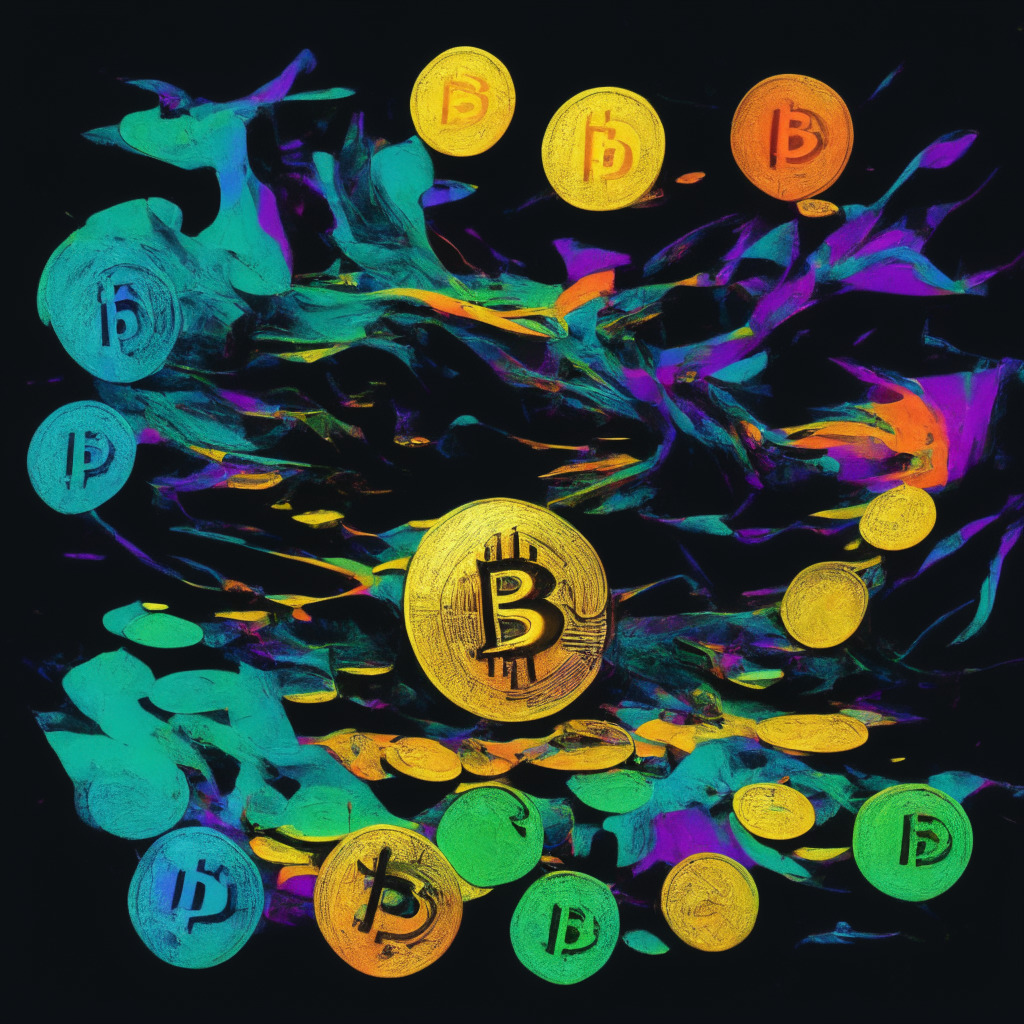An ethical hacker, known as “c0ffeebabe.eth”, has recovered roughly $5.4 million for DeFi protocol Curve Finance following a devastating hack. Despite this, concerns around fraudulent schemes and market instability have risen post-recovery, raising questions about Curve Finance’s future.
Search Results for: Wall
Balancing on the Edge: Will Bitcoin Tumble to $25k or Surmount the $29k Threshold?
“The cryptocurrency markets are at a pivotal point, with Bitcoin volume reaching a historical low, sparking concerns of a slide to $25K. With potential significant shifts on the horizon, many wonder whether Bitcoin value will rebound from the $28k threshold or plunge into the $25k zone. Regardless, investors are reminded of the volatility and risks of the crypto market.”
Ethereum Meme Coin Scandal: The Lucrative But Risky Bet for Novice Investors
“$BALD, a meme coin on Coinbase’s Ethereum layer-2 scaling solution, dropped 90% following rug-pull concerns. The incident emphasizes the risks of meme coins and demonstrates the importance of thorough contract examination using platforms like DEXTools to detect potential scams.”
Navigating the Swiftly Changing Cryptographic Asset and Blockchain Landscape: Successes, Setbacks, and Security Issues
“The cryptographic asset and blockchain industry continually evolves. Recent developments include banking issues for Hong Kong crypto businesses, digital criminality, varied progress for Binance in Dubai and Nigeria, operational updates at Kraken, central bank digital currency tests in Korea, and a new partnership for Sorare. These highlight the rapid advancement and regulatory challenges in blockchain technology.”
HashPort Bolsters Blockchain Operations with $8.5M Funding: Navigating Regulatory Hurdles and Ensuring Growth Potential
Japanese blockchain developer, HashPort, recently secured $8.5 million funding. The capital will be used to fortify its operations, compliance system, and team development amid evolving global regulations. HashPort’s operations include blockchain consulting and a public chain for nonfungible tokens (NFTs). Their cooperation with Expo 2025 aims to drive the development of digital wallets and digital passports linked to soulbound tokens.
Gucci’s Entry into NFT Space: Integrating High Fashion, Digital Asset Trade, and Exclusivity
“Gucci is rewarding Gucci Vault Material NFT holders with exclusive physical items – unique bags or wallets. However, to claim these items, holders must ‘burn’ their Material NFTs, thus relinquishing these digital assets, complicating the decision-making process. Gucci Vault Material NFTs also have an expiry date for physical redemption.”
Bitcoin SV’s Roller Coaster Journey: Surges and Slumps Amid Controversies and Comparisons
Bitcoin SV (BSV) surged 11% over 24 hours, marking a 7% weekly gain. Despite being overshadowed by the likes of Bitcoin and Ethereum, technical indicators suggest BSV’s rally might continue. However, with a bleak yearly performance and recent legal setbacks for its co-founder, uncertainty lingers over BSV’s long-term future.
Risky Profits and Rival Allegations: A Base Layer 2 Network Exploration
The Base network, a testnet built by Coinbase, is witnessing substantial profits through potentially risky trades, one example being the “bald” token (BALD). Market successes hint at high investor trust, but the crypto market’s volatility, coupled with practices like ‘calls,’ raises concerns about the sustainability of such investments. Market liquidity is increasing but there are obstacles, including the unidirectional flow of funds. The uncertain dynamic illustrates the definitive risks of the crypto landscape.
Unlikely Alliances and Divisive Lines: When Crypto Regulations Meet Freedom of Decentralization
The Bank Policy Institute (BPI) sides with Senator Elizabeth Warren to tighten cryptocurrency regulations via the Digital Asset Anti-Money Laundering Act, causing contention with crypto veterans. The bill requires enhanced surveillance and customer identity tracking, while banning digital asset mixers in efforts to prevent illicit activities. This raises questions about the balance between regulation and market freedom in cryptocurrencies.
Navigating the Turbulence: The Dizzying Heights and Depths of Worldcoin’s WLD Token
Worldcoin (WLD) has seen a 70% plunge from its debut price, now stabilizing at around $2.35. This crypto project founded by Sam Altman uses an airdrop linked to eyeball scanning for token distribution. The price of WLD is anchored around $2 until October 2023 due to its initial supply agreement, suggesting an interesting strategy to draw potential users.
Unmasking Tech Giants: Are Apple’s App Store Policies Stifling Crypto Innovation?
“Recent actions in the technology sector highlight the relationship between tech giants and blockchain and nonfungible tokens (NFTs). A probe into Apple’s App Store policies by US lawmakers aims to analyze if these guidelines indirectly slow technological progress. The lawmakers raise concerns about the impact of Apple’s rules on innovations like distributed ledger technology and NFTs, and potential negative consequences on the US’s status in emerging technology.”
US Banking Advocacy Group Backs Crypto Legislation: A Balance Between Regulation and Anonymity
Senator Elizabeth Warren’s reintroduced crypto legislation aims to bring transparency to digital asset transactions to mitigate risks of money laundering and terrorism financing. It requires digital asset wallets, blockchain transaction validators, and miners to preserve customers’ identity records, which may impact the crypto community’s cherished values of security, anonymity, and independence.
Navigating the Web3 Universe: An In-Depth Look at Launchpad XYZ
“Launchpad XYZ stands out among web3 companies by not only offering trading but also educational content, presale crypto assessments, and branching into gaming and Metaverse. Strong interest in its $LPX token demonstrates confidence in its vision for NFTs, gaming, and beyond.”
Regulating the Digital Ruble: Russia’s Bold Leap into Digitized Sovereign Assets
“The Russian Federal Bailiff Service can now seize digital rubles from citizens and collect fines in digital currency. This forecasts a future where citizens can pay debts directly from their digital wallets linked to Central Bank Digital Currencies (CBDCs), possibly even having their wallets frozen if convicted of crimes or debt negligence. Further, this may lead to cross-national digital currency ecosystems, offering transformative potential yet posing regulatory challenges and questions about personal financial freedom.”
DeFi’s $39M Loss Fuels Rise of ZK-Proofs: A Game-Changer or Mask for Dark Exploits?
“The DeFi sector has been shaken by substantial losses due to cyberattacks, stirring interest in zero-knowledge-proof (ZK-proof) technology. This tech allows for encrypted, private transactions without revealing sensitive details, improving transaction speed and security. However, it may hinder industry transparency and has implementation challenges.”
Navigating the Cryptocurrency Landscape: Blue-chip Stagnation, Meme Coin Volatility and BTC20 Potential
While major cryptocurrencies like Bitcoin and Ethereum are relatively stable, high-volatility seekers are turning to the meme coin market. Coins such as Pegasus SniperBot, Scarab, and Ascend Coin have been gaining traction due to their unique features and growth trend. However, these investments often lack broader vision or function and carry significant risk, including buy and sell taxes. Investing in promising pre-sale projects, like BTC20 which aims to emulate Bitcoin on an ecofriendly Ethereum blockchain, can be more secure and rewarding. But, potential investors must always evaluate the risks involved in this high-risk asset class.
BlackRock and the Anticipation of Bitcoin Spot ETFs: A Glimmer of Hope or a Brewing Storm?
BlackRock, along with Fidelity and Ark Investments, have filed for Bitcoin spot ETFs potentially signalling a new wave of institutional investments into digital assets. This would grant investors direct access to Bitcoin, possibly cause a price surge, but could also lead to capital outflows from mining stocks to more regulated, potentially profitable Wall Street financial products.
Unmasking Crypto Anonymity: The Controversy and Consequences of Arkham Intel Exchange
Arkham Intel Exchange, a new platform offering monetary rewards for identifying anonymous crypto users, is sparking debate within the digital currency industry. Despite privacy concerns, many are utilizing the service to expose those behind major crypto exploits. Arkham exemplifies the intricate balance between crypto’s privacy struggle and the desire for transparency.
Exploring Web3 & Blockchain: An Insight into the Gaming Industry’s Future
“The entrance of Web3 into the gaming industry, particularly with blockchain gaming, presents a mix of anticipation and skepticism. Simon Davis, CEO of Mighty Bear Games, sees the potential for player-owned economies underpinned by digital property rights. However, achieving Web3 dominance requires addressing user education, especially regarding private key holdership, and enhancing mobile-driven adoption.”
Dutch Central Bank Recognizes Crypto.com: A Regulatory Triumph or a Compliance Challenge?
“In a significant shift in regulatory climates, Crypto.com has been officially registered by the Dutch central bank, signaling its commitment to compliance. This comes after issues faced by Binance and Coinbase. The upcoming European Union laws for 2024 could necessitate not just registration, but licensing, implying checks on governance and fiscal health. This points to the need for ongoing dialogue about regulations.”
Redrawing the Landscape: Sequoia Capital’s Dramatic Cutbacks in Crypto Investments
“Venture capital titan, Sequoia Capital, has notably reduced its cryptocurrency fund by over 65%, from $585 million to $200 million, amidst a fluctuating crypto market. The company’s strategic shift involves focusing on nascent start-ups rather than investing in larger firms. This comes as the firm, and other venture capitalists, retract their crypto investments amid turbulent market conditions.”
Navigating the Dutch Regulatory Landscape: Successes and Challenges for Crypto Platforms
“Crypto.com secures registration approval with the Dutch central bank, De Nederlandsche Bank (DNB), joining 36 other crypto businesses in the country. The approval highlights Crypto.com’s commitment to compliance and allows it to offer exchange and custodial services. Other platforms, like Binance, face rejection from the Dutch market due to regulatory uncertainties.”
Exploring Japan’s Web3 Landscape: HashPort Group’s Expansion and the Challenges Ahead
“Japanese Web3 developer HashPort Group has secured $8.5M in funding, led by Sumitomo Mitsui Banking Corporation, boosting Japan’s evolving Web3 landscape. The funds will assist HashPort to expand, navigate complex regulations, strengthen compliance management, and further blockchain-related endeavors, including NFTs and metaverse games.”
From Memecoin to Contender: The Remarkable Evolution of SHIB and the Launch of Shibarium
“SHIB, once a memecoin, is becoming a substantial blockchain contender with the launch of Shibarium, a layer 2 network. Shibarium promises potential price jumps for its tokens due to increased demand. It aims to solve scaling and data challenges by consolidating transactions, thereby reducing fees.”
Unibot’s Skyrocketing Success: A Case Study in Cryptocurrency Innovation and Investor Rewards
The Telegram-based exchange Unibot is seeing significant investor interest, with its token holders gaining nearly 200 times their initial capital. The platform simplifies on-chain trading, pays dividends in ether (ETH), and has seen user base surge recently. With its user-friendly utility and lucrative fee-sharing model, demand for UNIBOT may likely increase.
Crypto.com’s Registration in Netherlands: A Leap for Digital Currency Market or Regulatory Trickery?
“Crypto.com has registered as a cryptocurrency service provider in the Netherlands, after complying with the nation’s regulations against terror financing and money laundering. However, providers are only allowed to offer cryptocurrency wallets and facilitate fiat-crypto exchanges in the country.”
Sequoia Capital Trims Crypto Investment by 65%: Strategic Shift or Declining Faith?
“Sequoia Capital has reduced its cryptocurrency investment allocation by a notable 65%, down to $200 million from $585 million, as part of a revised approach influenced by the shifting crypto market’s dynamics. This adjustment reflects a trend of VCs nurturing startups rather than backing mature firms.”
Stablecoin Policy Disputes: A Milestone or Impediment for Crypto Regulation?
“The Clarity for Payment Stablecoins Act (H.R. 4766) negotiations spark political debate. While some view this potential legislation as crucial for cryptocurrency regulation, others express concern about rushed decisions, lack of oversight, and regulatory dissonance. Rep. Warren Davidson’s ‘Keep Your Coins Act’ also enters the conversation, aiming to protect individual’s self-custodied crypto wallets.”
Optimism Surpasses Arbitrum in Daily Transactions: The Tale of Two Blockchains
“Blockchain layer-2 Optimism surpassed Arbitrum in daily transactions, largely thanks to the emergence of Worldcoin. Despite Optimism’s transaction rates, it trails in daily active wallets compared to Arbitrum. The competition between these two demonstrates the evolving nature and diverse directions of blockchain technology.”
Navigating the Crypto Storm: Rising Institutional Involvement, Legal Scuffles, and Metaverse Aspirations
The CME’s regulated bitcoin and ether futures experienced heightened involvement from large traders in Q2 amid financial market volatility, indicating growing trust in such platforms. However, the credibility of key crypto market players is under the scanner as FTX founder Sam Bankman-Fried faces allegations from the DOJ of witness interference. Meanwhile, despite financial struggles, Meta remains committed to its metaverse vision.
Palm Foundation’s Move to Polygon Supernet: Innovations in NFT Infrastructure and the Path Ahead
Palm Foundation, with support from Polygon Labs and Consensys, is developing a Polygon Zero Knowledge Supernet to simplify onboarding and expand its NFT infrastructure. The plan includes addressing governance through Decentralized Autonomous Organizations and enhancing transaction speed while maintaining low gas fees. The initiative, targeting broader Web3 user-base, will complete its migration to a ZK Supernet by 2024.
Exploring Reddit’s Retro Reimagined: A Dive into the Thrilling World of NFT Avatars
Reddit has launched its largest non-fungible token (NFT) collection, the Gen 4 Collectible Avatar series. This includes unique Avatars created by 100 artists and featuring reinterpretations of the famous Snoo character. This NFT marketplace incorporates initial access and purchasing limits to protect against unethical activities and bots.






























